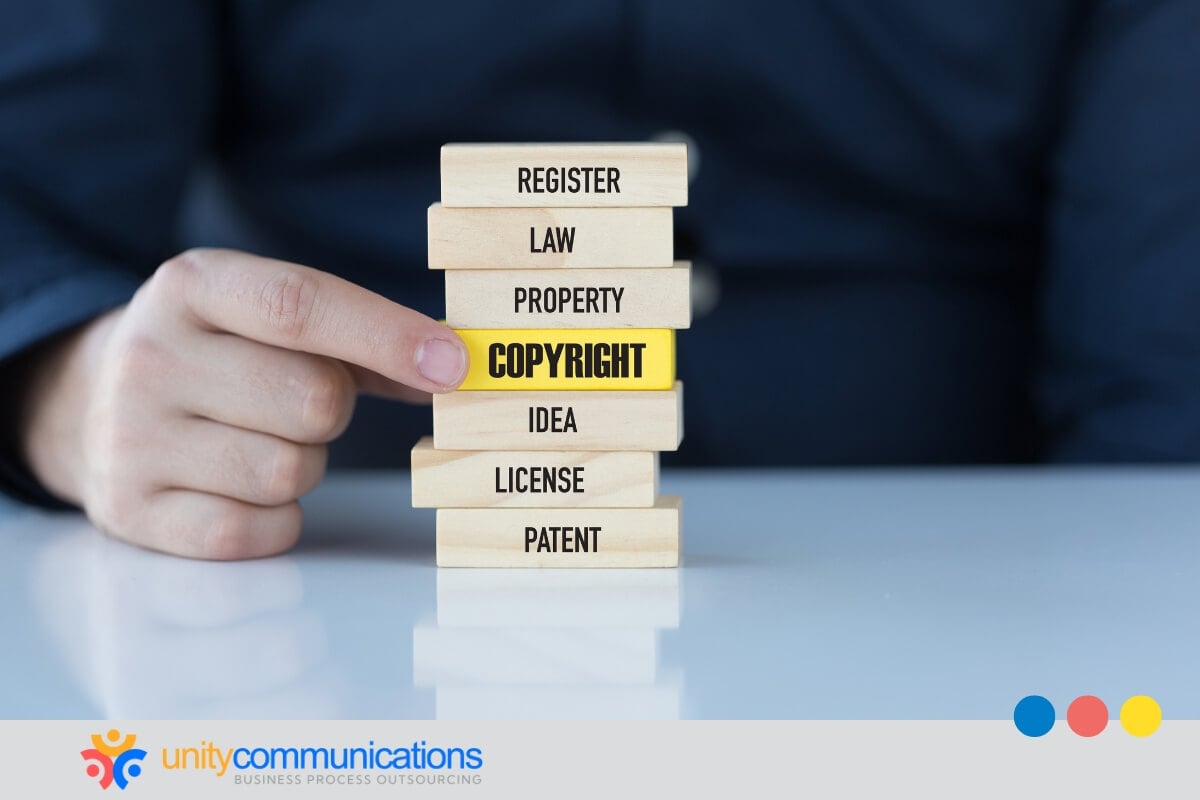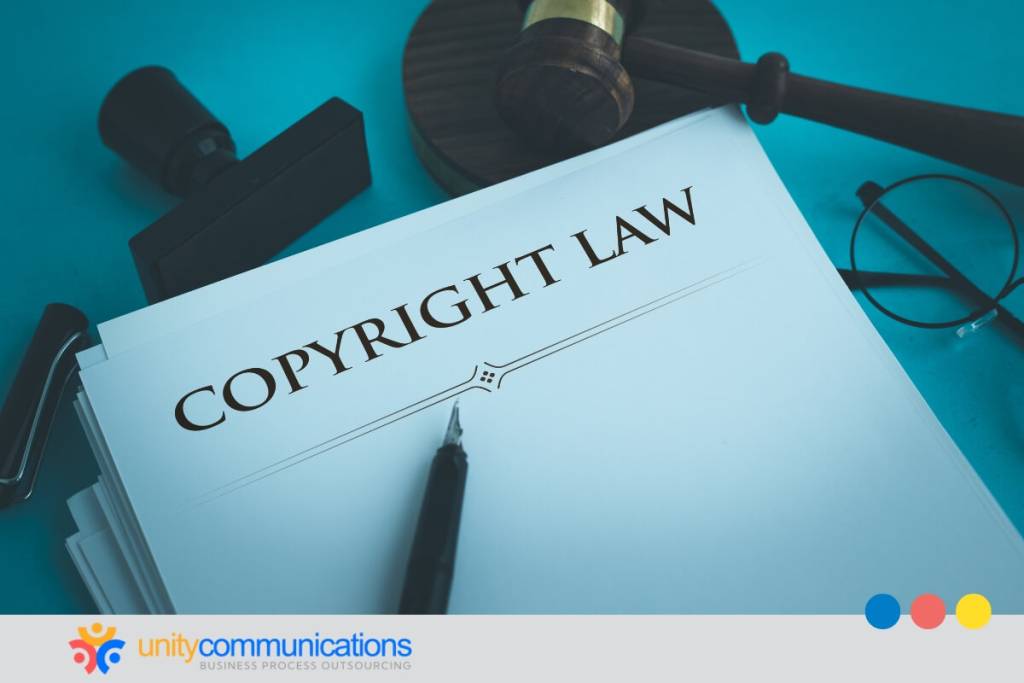IN THIS ARTICLE
Table of Contents
In today’s globalized landscape, copyright legislation is crucial for shielding enterprises’ intellectual assets. With the rising prominence of business process outsourcing (BPO), companies are increasingly concerned with preserving their intellectual property (IP) during partnerships.
Keep reading to learn how BPO providers can protect their creations and proprietary data by adhering to copyright laws.
This article talks about the fundamental principles of copyright law, its relevance to BPO, and actionable strategies service providers take to ensure adherence and steer clear of potential legal conflicts.
Overview of BPO compliance and relevant copyright laws

Copyright protection in business process outsourcing agreements extends to various original creative works and IPs involved in BPO operations. Copyright protects original works of authorship fixed in a tangible medium of expression. In the context of BPO, this can include:
- Computer code and applications developed or utilized for performing BPO services
- Written content such as documentation, manuals, reports, and marketing materials
- Graphic designs, logos, and multimedia content used in BPO-related projects
- Databases and data compilations created or accessed during BPO activities
Copyright also extends to other IP properties that may be relevant in BPO, such as:
- Trademarks – brand names, logos, and symbols associated with BPO services
- Trade secrets – confidential business information, processes, and strategies used in BPO operations
Copyright protection is automatically granted upon the creation of an original work. Formal copyright registration is generally not required, although registration can provide particular legal benefits. The copyright owner has exclusive rights to reproduce, distribute, perform, display, and create derivative works based on the copyrighted material.
The purpose of copyright protection in BPO is manifold:
- Encouraging innovation. Copyright protection incentivizes creators to develop new software, content, and other creative works that might be utilized in BPO services.
- Promoting investment. Copyright protection assures creators and investors that their IP rights are protected. This security covers the resources spent developing creations and encourages additional investment in BPO-related technologies and innovations.
- Facilitating commerce. Copyright protection facilitates the licensing and commercialization of copyrighted works, allowing BPO providers to legally use and monetize proprietary software, content, and other IPs.
- Protecting rights. Copyright protection safeguards the rights of IP creators and owners, ensuring they have control over how their works are used and preventing unauthorized copying, distribution, or modification by third parties.
Copyright laws and regulations have a variety of effects on BPO operations, particularly in regard to intellectual property rights (IPR). Here are some key aspects:
- IPR protection. BPO often involves handling proprietary information, including copyrighted materials such as software, databases, documents, and creative works. Service agreements must include clauses ensuring the protection of these IPRs.
- Contractual obligations. Service agreements between BPO providers and clients typically include provisions addressing copyright ownership, confidentiality, and IP use. A clear delineation of rights and responsibilities helps prevent disputes over copyright infringement or misuse of proprietary information.
- Fair use and fair dealing. BPO providers might rely on exceptions such as fair use in the U.S. or fair dealing in other jurisdictions for limited and transformative use of copyrighted materials. Understanding the scope and limitations of these exceptions is crucial to avoid infringing on copyright holders’ rights.
- Digital Millennium Copyright Act (DMCA). Compliance with the DMCA is essential for BPO providers operating in the United States. This law establishes procedures for addressing copyright infringement claims related to online content, including requirements for takedown notices and counter-notices.
- Copyright enforcement. BPO providers must have policies and procedures to promptly address copyright infringement allegations. These include responding to copyright infringement notices, implementing measures to prevent unauthorized use of copyrighted materials, and educating employees about copyright compliance.
Legal ramifications of copyright violations in BPO
Copyright compliance ensures that BPO providers respect the IP rights of content creators, software developers, and other copyright holders. Respecting these rights helps maintain a fair and ethical business environment and fosters trust among clients and partners.
Moreover, BPO providers are legally obligated to respect and adhere to copyright laws and regulations. Failure to comply with copyright requirements can result in legal consequences, including lawsuits, fines, and damages for copyright infringement.
The legal ramifications of copyright violations in BPO can include:
- Civil liability. BPO providers might be subject to civil lawsuits filed by copyright holders alleging infringement of their IP rights. Civil remedies for copyright infringement can include injunctions, damages, and disgorgement of profits.
- Criminal liability. In willful and egregious copyright infringement cases, BPO providers and their employees can face criminal charges under applicable copyright laws. Criminal penalties for willful copyright infringement include fines of up to $250,000 per offense and up to five years of imprisonment.
- Contractual breach. BPO providers might violate contractual agreements with clients or subcontractors by engaging in copyright infringement or failing to comply with copyright requirements. Contract breaches can lead to legal disputes, contract terminations, and financial liabilities.
- Regulatory enforcement. Regulatory authorities might investigate and enforce copyright compliance through audits, inspections, and enforcement actions against non-compliant BPO providers. Regulatory penalties for copyright violations include fines, sanctions, and revocation of licenses or permits.
Common copyright challenges BPO companies face

BPO companies often encounter challenges in complying with copyright laws due to the nature of their operations and tasks. Some common copyright challenges that BPO companies face include:
- Fair use and transformative use. Determining whether using copyrighted materials qualifies as fair use or transformative use can be subjective and uncertain. BPO companies must assess the legality of their use of copyrighted materials and consider the purpose, nature, and extent to avoid infringing copyright holders’ rights.
- Cross-border compliance. BPO operations often span multiple jurisdictions with different copyright laws and regulations. Ensuring compliance with copyright requirements in each jurisdiction can be challenging, particularly when conflicting legal standards or cultural differences regarding copyright protection exist.
- Third-party content management. BPO companies might encounter copyright issues when using third-party content, such as images, videos, or articles, in their services. Ensuring proper licensing, attribution, and permission for third-party content is essential to avoiding copyright infringement claims.
- Employee training and awareness. BPO employees must be educated about copyright laws, regulations, and best practices to prevent unintentional copyright violations. BPO companies should provide comprehensive training and guidelines on copyright compliance to mitigate the risk of employee misconduct or negligence.
- Emerging technologies. Rapid technological advancements, such as artificial intelligence (AI), present new challenges and opportunities for copyright compliance. BPO companies must stay abreast of technological developments and adapt their practices to effectively address copyright issues related to emerging technologies.
Measures BPO firms take to prevent copyright infringement
So, what are BPO providers’ solutions to ensure copyright compliance? BPO firms employ various measures to prevent copyright infringement and violations, ensuring compliance with copyright laws and regulations through the following:
- Employee confidentiality agreements. BPO firms require employees to sign non-disclosure agreements (NDAs) to protect client confidentiality and IP rights. These documents establish clear guidelines and protocols for handling sensitive information and proprietary materials to prevent unauthorized disclosure or misuse.
- Contractual agreements. BPO firms negotiate and draft comprehensive contractual terms with clients and subcontractors, including provisions addressing copyright ownership, licensing, indemnification, and dispute resolution. They clarify rights and responsibilities related to IP to prevent misunderstandings and disputes.
- Digital rights management (DRM). BPO firms utilize DRM solutions to protect digital content from unauthorized copying, distribution, and modification. DRM enforces access controls, encryption, and watermarks to safeguard copyrighted materials and prevent piracy or misuse. The DRM market will reach $7.9 billion by 2027.
- Copyright policy and training. BPO firms establish comprehensive copyright policies outlining legal requirements, best practices, and consequences of non-compliance. They provide regular training sessions to employees, educating them about copyright laws, fair use principles, and the importance of respecting IP rights.
- Compliance checks. BPO firms implement rigorous processes for reviewing and verifying the copyright status of materials used in their operations. They conduct due diligence to ensure that software, content, and other copyrighted materials are properly licensed and authorized.
The bottom line

Addressing common copyright challenges requires proactive measures, including comprehensive contractual agreements, compliance policies, employee training, and risk management efforts.
By prioritizing copyright compliance, BPO companies can mitigate legal risks, protect IP rights, and maintain trust and confidence among clients and stakeholders.
Let’s connect to learn more about how BPO providers can ensure adherence to copyright laws.





